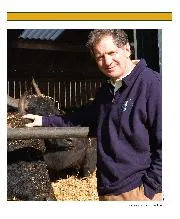Now Villeneuve was heading into his second full season and was fully on song. It could have been fireworks. That it wasn’t, that instead the team-mates got along famously, says much about both men. They bonded on trips from Monaco to Maranello between the races and found themselves united in approach and state of mind, amid the rampant politics that poisoned Ferrari for so many before and since.
Here’s a big clue as to why Scheckter and Villeneuve got on. “You know it’s funny, I never had a bad word with any of my team-mates,” says Jody. “If they were quicker than me it wasn’t their fault, it was my fault. You had to be dead honest. If you weren’t, the relationship just deteriorated. If you made an adjustment and it was a little bit better, you’d think f**k, I don’t want to tell him that. But you have to.
“Gilles was an honest, honourable guy. We said right at the beginning, when we first got together, we agreed there was so much bullshit out there with the Italian press, so let’s stick together and not listen to them. And that’s what we did. I didn’t take any notice.
“I think other drivers, [Carlos] Reutemann for example, got all wound up by all the bullshit. Every time I went up there [to Ferrari] before I started working for them, the Old Man invited me in and we had lunch. The first day at work he didn’t! I was sat outside, you know? You can imagine people getting wound up by that. But I thought, I want to win the championship, I’m paid enough, I don’t care. Any real professional racing driver, all the top guys, you’ve got to take that attitude, otherwise you’ll get wound up by all sorts of bullshit.”

Screening out the bullshit: Jody and Gilles in Argentina, ’79
Grand Prix Photo
In this context, it’s no surprise Villeneuve never had a problem sticking to the rules at Monza that day in 1979. It also further explains his fury three years later when Didier Pironi raced him and won at Imola, in a scandal that triggered the sequence of events that ended in violent abruptness with Gilles’ fatal accident in practice at Zolder.







